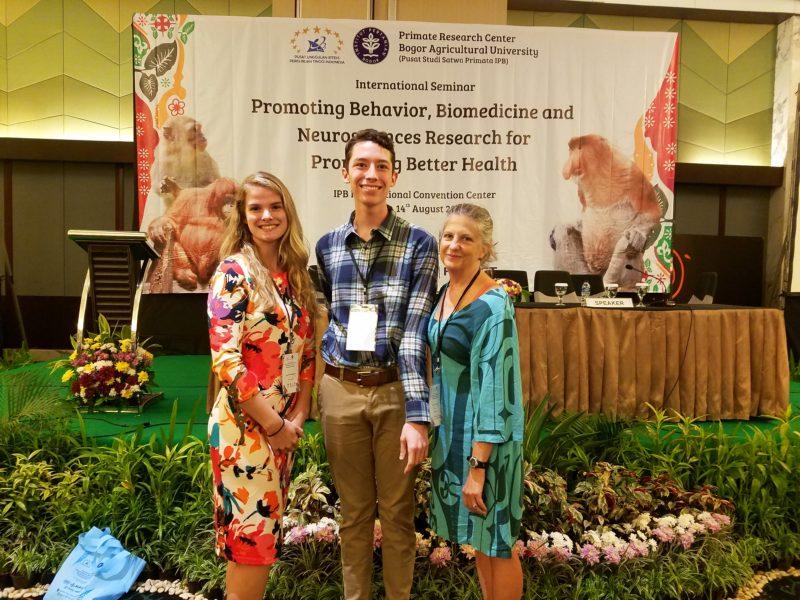Neuroscience major research partners Anna Rigodanzo and Ryan Reusch are making big waves in neuroscience research under the direction of Kimberley Phillips, professor of psychology. In the spring of 2016, Rigodanzo and Reusch joined Phillips’ lab.
Rigodanzo reflects that she and Reusch didn’t know each other very well, but they were the only two underclassmen students in the lab. Now, the research duo has been working together for two years, which has included two summers of research and a trip to Indonesia.
“Ryan, Dr. Phillips and I collaborate really well together, which is important for our work as we need to be able to bounce ideas off of one another and count on each other to get the job done,” Rigodanzo said.
The lab is focused on brain changes associated with motor learning in capuchin monkeys and other nonhuman primates.
“Basically, we’re interested in how behavior can create positive changes in the brain and how we can use that information to either better understand the brain processes or develop rehabilitative treatments for disorders such as strokes, traumatic brain injuries, or multiple sclerosis,” Rigodanzo said.
“‹In August, Rigodanzo and Reusch traveled with Phillips and one of her colleagues to Indonesia to conduct a field study on a wild population of long-tailed macaques. The team was invited to the International Symposium for Primate Behavior, Biomedicine and Neuroscience in Bogor, Indonesia by another of Phillips’ colleagues who runs the field site where the team was conducting research. The team lived on an uninhabited island with no running water, showers or sinks while conducting their research.
“The conference was near the end of our trip, so we had been busy doing a lot of data collection and travelling before the conference,” Reusch said.
There were multiple struggles associated with trip to Indonesia to complete the research. On top of the long hours of work, the conditions where the team lived were fairly primitive. The team vividly remembers the rough conditions of their research center in Indonesia, reflecting that they didn’t shower for over a week and a half.
“I’ve been an avid camper my whole life who practically grew up outdoors and there’s still nothing that could’ve really prepared me for it. The bright side is that I feel like now I can handle basically anything,” Rigodanzo said.
“‹Phillips’ lab typically works with capuchin monkeys and marmosets; however, the team was able to work with Old World monkeys, which are larger than a house cat and have a reputation for aggression. When asked what the scariest part of research was, Rigodanzo said she was at first afraid of the wild creatures, which have a reputation for aggression.
“We were really fortunate, though, to have Dr. Phillips and her colleague by our side. Between the two of them, they’ve got several decades of experience working with all kinds of monkeys. Everything ended up being fine, but it definitely taught me a new appreciation for the vigilance and awareness that field researchers who do this for a living have to have,” Rigodanzo said.
“‹After graduation, Rigodanzo plans to work as a research assistant to build clinical experience before she applies to clinical neuroscience Ph.D. programs.
“I know that the research experience I’ve gained and the connections I’ve made to Phillips’ lab will be invaluable to my future as a researcher and clinician,” Rigodanzo said.
As Reusch explains, the pair’s primate research isn’t yet complete.
“We will continue analyzing neuroimages in order to more fully understand the changes that are seen after motor learning. Then we will begin the motor learning training period with the second cohort of monkeys to reach our total sample size of 32 monkeys,” Reusch said.
“‹Reusch and Rigodanzo, despite the intense conditions of research completion, reflect with almost complete positivity about their ongoing summer project. Both members of the duo encourage anyone interested in research to actively pursue it. When asked what advice she would give to anyone who is interested in pursuing research, Rigodanzo said to go for it and regardless of the field, don’t be intimidated.
“The best way to figure out if research is for you, no matter what your field, is to do it. You’ll be surprised how far it’ll take you,” Rigodanzo said.
“Definitely go for it. Research is one of the most rewarding Trinity experiences I have had. However, it requires patience and persistence, so be prepared for some struggles before the successes come,” Reusch said.







